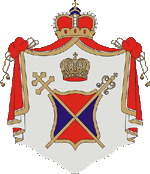
Back Чарнагорская Праваслаўная Царква Byelorussian Crnogorska pravoslavna crkva BS Montenegrinisch-orthodoxe Kirche German Iglesia ortodoxa montenegrina Spanish Église orthodoxe monténégrine French Égllése ortodoxe du Montènègro FRP Crnogorska pravoslavna Crkva Croatian Montenegrói ortodox egyház Hungarian Chiesa ortodossa montenegrina Italian モンテネグロ正教会 Japanese
| Montenegrin Orthodox Church | |
|---|---|
| Montenegrin: Црногорска православна црква, romanized: Crnogorska pravoslavna crkva | |
 Coat of arms of the MOC | |
| Abbreviation | MOC (English) CPC/ЦПЦ (Montenegrin) |
| Type | Eastern Christian |
| Classification | Independent Eastern Orthodox |
| Scripture | Septuagint, New Testament |
| Theology | Orthodox theology |
| Polity | Episcopal |
| Governance | Holy Synod of the Montenegrin Orthodox Church |
| Metropolitan | Mihailo[1][2] |
| Language | Church Slavonic, Montenegrin |
| Headquarters | Cetinje |
| Territory | Montenegro |
| Founder | Antonije Abramović |
| Independence | c. 1993 |
| Separated from | Serbian Orthodox Church (1993) |
| Separations | Montenegrin Orthodox Church (2018) |
| Members | 10% of Orthodox Christians in Montenegro (2021) |
| Official website | www |
The Montenegrin Orthodox Church (Montenegrin: Crnogorska pravoslavna crkva, Црногорска православна црква; abbr. MOC, CPC or ЦПЦ) is a canonically unrecognized Eastern Orthodox Church.[3][4] It was formed in 1993 and registered as a non-governmental organization.[5][6] Antonije Abramović was appointed as its first metropolitan.[7] It claims succession to an older and autocephalous Montenegrin Church, which operated until the unification of the Kingdom of Serbia and Kingdom of Montenegro, later to join the Kingdom of Serbs, Croats and Slovenes in 1918.[5]
The Montenegrin Orthodox Church has been recognized as a religious organization by the Government of Montenegro since 2001. According to a 2020 poll conducted by CEDEM, approximately 10 percent of Montenegro's Eastern Orthodox Christians have opted for the Montenegrin Orthodox Church, while approximately 90 percent have opted for or stayed with the Serbian Orthodox Church in the canonical or widely-known Eastern Orthodox Church.[8] Notably, the creation of the MOC has been opposed by the Ecumenical Patriarchate of Constantinople. Patriarch Bartholomew has stated that "we will never give autocephaly to the so-called 'Montenegrin Orthodox Church'" and that its leader Dedeić was suspended by Constantinople for adultery and embezzlement.[9][10][11][12]
- ^ CPC: Ministarstvo odbilo zahtjev raščinjenog episkopa Borisa da se upiše kao poglavar crkve
- ^ Ministarstvo pravde odbilo zahtjev Bojovića da se proglasi mitropolitom CPC
- ^ Country Reports on Human Rights Practices Volume 1. U.S. State Department. 2007. p. 1479.
Tensions continued between the canonically unrecognized Montenegrin Orthodox Church and the Serbian Orthodox Church...
- ^ Šístek, František (2011). "Clericalization of Nationalism: Interpreting the Religious Rivalry between Serbian and Montenegrin Orthodox Churches". In Máté-Tóth, András; Rughinis, Cosima (eds.). Spaces and Borders: Current Research on Religion in Central and Eastern Europe. Walter de Gruyter. p. 117. ISBN 9783110228144.
- ^ a b Mentzel, Peter C., ed. (2021). For God and Country: Essays on Religion and Nationalism. MDPI. p. 105. ISBN 9783039439058.
- ^ Motyl, Alexander J.; Schnetzer, Amanda, eds. (2004). Nations in Transit 2004: Democratization in East Central Europe and Eurasia. Rowman & Littlefield. p. 504. ISBN 9780742536463.
- ^ "Raskol u Crnogorskoj pravoslavnoj crkvi, izabran novi mitropolit". N1 (in Serbian). 2023-09-03. Retrieved 2023-10-31.
- ^ "United States Department of State". United States Department of State. 2021-05-12. Retrieved 2021-07-25.
- ^ Bardos, Gordon (January 28, 2020). "Montenegro's Corrupt Party of Socialists Is Killing the Country". The Center for the National Interest, Washington, DC.
- ^ "Patriarch Bartholomew: We will never give autocephaly to the 'Montenegrin church'". Orthodox Christianity. December 31, 2019.
- ^ "Ecumenical Patriarch Bartholomew: The Phanar will never recognize an autocephalous Church in Montenegro". Orthodox Times. Dec 30, 2019.
- ^ Pietrobon, Emanuel (December 23, 2019). "Pope Francis Comes Out Against Orthodox Christianity's Balkanization". Insideover.
© MMXXIII Rich X Search. We shall prevail. All rights reserved. Rich X Search